#kintouri
Explore tagged Tumblr posts
Text

Another fanart of And Then We Danced / და ჩვენ ვიცეკვეთ (2019) dir. Levan Akin
I know most of you would simply put Merab and Irakli dancing together above that text BUT in my opinion it would be a sin not to use Irakli's dance-coded nonverbal message to Merab since it fits "KEEP CALM" so damn well!!!

Well, dear fellow ATWD fans - It seems like I'm starting another art series! Its working title is: "ideas so obvious I can't believe nobody did that before me"
In other words - this is so uncreative and style-lacking that my own brain doesn't even recognise it as my art... But I couldn't not let it exist once I got that idea, right? Somebody should've made it years ago! - so if I can't find it then let that "somebody" be me, that's all🤷
#atwd fanart#my atwd fanart#my art#and then we danced#atwd#და ჩვენ ვიცეკვეთ#irakli#bachi valishvili#atwd kintouri trail#keep calm#yeah I probably should have used printed letters as everyone else and not draw them...#kintouri#georgian dance#pencil art#traditional art
7 notes
·
View notes
Text
Kintouri to Die for
Best dancing scene from the movie: Merab and Irakli dancing the Kintouri. If Aleko hasn't found out by now how these two guys feel about one another, he's incredibly stupid...
youtube
#and then we danced#merab x irakli#atwd#levan gelbakhiani#bachi valishvili#kakha gogidze#levan gabrava actor#Youtube
5 notes
·
View notes
Text
Dance as Covert Queerness & Masculinity Intersecting Class and Same-sex Desire in And Then We Danced (2019)
In the film, And Then We Danced (2019), directed by Levan Akin, the main character, Mehrab, a Georgian dancer begins living a double life upon the arrival of a replacement dancer, Irakli. In the scene where Aleko instructs Mehrab and Irakli to perform the Kintouri duet together so that Mehrab may learn from someone better than him, they willingly perform their movements in synchrony with each other and they appear in emotional harmony as well. In "Dancing Marines and Pumping Gasoline: Coded Queerness in Depression-Era American Ballet" by Jennifer Campbell, the author illustrates, "The queerest aspect of this scene's choreography... is found in traditional ballet movement... taking on the traditional chivalrous role of the male dancer but for another man, not for a ballerina" (Campbell, 6). In Mehrab and Irakli's dance they display their hands out to each other, lock eyes with one another as their bodies closely occupy the space between them, and intermittently intertwine their outstretched arms with each other. Despite Aleko's later explanation that Georgian dance is "masculine", a space is created for these characters to engage in a sense of intimacy and synchrony that evokes perspiration and excitement without the inclusion of genitals. This allows for a reading of this choreography between two men to be suggestive through queer coding along with their form-fitting clothes they wear. Later in the film, Mehrab and Irakli engage in a playful but rough fight over sharing a cigarette late at night away from Mary, who Mehrab is questionably in a heterosexual relationship with. Their fight rapidly escalates into them simultaneously jerking each other off. Campbell notes, "Queered masculinity on the ballet stage in a way that made a "both/and" possible -- a ballet could lead a double life, hospitable to those drawn to chivalrous heterosexuality and male homoeroticism at the same time"(Campbell, 11). There is homo-duality in Mehrab and in the masculinity of the supporting characters. Unlike Mehrab's play fight with Irakli that leads to sex, he also engages in a very short altercation with his brother, Gela, after discovering he's lost his job due to his brother. Gela and Irakli also share a sense of homo-duality because they settle into heteronormativity to gain financial aid or potential prosperity through their marriage contracts with their respective spouses family's wealth or possibility there of which seems effeminate which intersects their masculinity with class like Mehrab's does with same-sex desire.
0 notes
Photo


Levan Akin and Levan Gelbakhiani about Kintouri
And Then We Danced / და ჩვენ ვიცეკვეთ (2019, Levan Akin)
11 notes
·
View notes
Text
Quick Sunday six something-for-everyone aka me grabbing my two tiny fandoms and holding them together like 'now kiss!!' Blame @erinaceina she just wanted cute au headcanons about the band members meeting the ATWD boys oh...two years ago, and it spiralled into...*gestures at 300k wip and all the other note files*
Merab unfolded the red chokha from his bag and swung it over his shoulders like it was an embrace. He caught Irakli watching him do so and his answering smile was a mixture of seduction and coyness.
It worked - Irakli stepped closer, cautious but enraptured, reaching a hand out to bring the decorative lines of masrebi together over Merab's chest. The way Irakli did the fastenings up made Merab feel like he did when Irakli bent to kiss him, and he had to bite his lip to stop himself from pressing up onto the balls of his feet and stealing a kiss then and there.
Behind him a door opened - the ladies' bathroom - and Philippa Crawford turned away on emerging, smiling, with an apology that both men would have denied was necessary.
They strode out onto the little stage at the end of the room and lined up, waiting for the music to begin when the owner changed the CD in the player. It was the first time, Merab realised, that he had officially performed folk dance without a jealously critical audience of his peers, or the stern eye of Aleko or his family overseeing him. He felt that the moment had more in common with the night they had danced in the park for tourists in Tbilisi, and he let himself grin as the beat for the kintouri gathered, the drums knocking out an anticipatory rhythm.
2 notes
·
View notes
Text
my mind is a constant replay of merab dancing the kintouri completely carefree and at ease with himself while two homophobic dance instructors yell at him that he’s butchering traditional georgian dance with his “female moves”
133 notes
·
View notes
Photo







A few months ago, as riots were going on in Tbilisi over the premiere of Levan Akin’s film, a wonderful young lady taught me a little bit about the reasons: the strange positioning of the figure of the traditional dancer in Georgian culture, and the battle for the identity of that figure fought between the LGBTQ+ activists and the radical right, both of whom take the figure as “their own”. I figured it would be a good introduction to the film, when I eventually get to see it. The truth is, the film needs no introduction. It has its glitches. Yet overall, it is impossible not to love it - and even more the wonderful characters, both boys and girls, it introduces us to.
Oh, and kintouri again, possibly my favourite scene <3
- And Then We Danced, Levan Akin, 2019
47 notes
·
View notes
Photo
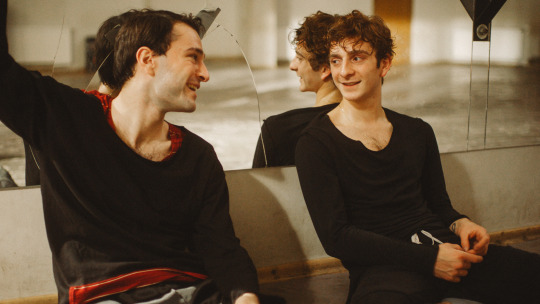
Life in Film: Levan Akin
“Someone told me, ‘You are one person when you make the film, another when it’s over’. And that’s really the case with this film, it’s changed me fundamentally.” —The writer and director of And Then We Danced talks to our London correspondent Ella Kemp about masculinity, queer love stories, Georgian cinema and the ever-quotable joys of Romy and Michele’s High School Reunion.
Love stories come and go, but few have the golden warmth of Levan Akin’s dance-romance, And Then We Danced, which has captivated Letterboxd members enough to garner an impressive 4.0 rating out of 5. The film follows Merab (Levan Gelbakhiani), a dancer who has grown up training at the National Georgian Ensemble, and is moved to examine the structures and traditions he exists within when the charismatic Irakli (Bachi Valishvili) arrives at the company.
Akin was born and raised in Sweden, the son of a Georgian family who emigrated in the 1960s. Following the attacks at the 2013 Pride parade in the Georgian capital of Tbilisi, the solidarity among the country’s gay and queer communities became more urgent. Akin was moved to turn away from the big-budget Swedish TV productions he has made a name directing, in order to connect back to his roots for this project. But And Then We Danced isn’t solely a political commentary—it moves and feels freely.
Akin’s film gives audiences a long-overdue education on traditions far outside Hollywood: we see the rigid rules of Georgian dance, the way a body is taught to bend and extend and survive, and how spontaneous feelings have no place in that education.
If the film, told from such a unique perspective, also feels somehow familiar, it’s because Akin, who wrote, directed and co-edited, is a magnanimous cinephile. He’s been watching and understanding love stories since he can remember, and speaks of them with immense enthusiasm. There are years of wisdom and observation in the details of And Then We Danced. Every time I admit to him I haven’t seen a film he mentions, he looks sincerely happy for me that my world is yet to experience it.
Answering our Life in Film questionnaire, Akin shares memories of ABBA as a national treasure, the first film that blew him away in cinemas as a child, and why Tarkovsky could have done with being a little more queer.
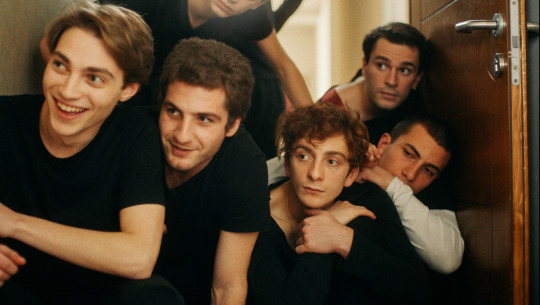
This is quite a departure from the scale of your television projects. What drew you back to Georgia and those difficult circumstances? Levan Akin: I come from a background of making bigger projects, and this wasn’t obviously what a person like me should be doing next. I did a lot of Swedish TV, but I had grown tired of working the way I did. I started working for [Swedish film and commercial director] Roy Andersson when I was 22 and then I went into TV—I never went to film school. I applied twice and I didn’t get in! I was brought up in the SVT [Swedish public broadcasting service] way of making TV series. You have a script, you break it down, sometimes you write it yourself, sometimes you don’t, you do the shot list, you work with the actors, you block the scene and you move on and that’s all fine and good.
But after my previous film I was very tired. I was 36 then, and had sort of forgotten why I was making films. I had seen this Pride parade, the one where they were attacked in Georgia in 2013, and I couldn’t stop thinking about it. So I went to Georgia and did some research with my own little camera, and it very organically developed into this film. I never sat down and thought I’d write a story about this dancer. I used what happened around me, and I found a lot of real people. We often weren’t allowed to film in places a lot of the time—we made up stories about what we were doing. We had to have bodyguards, we’d lose locations on a day’s notice. It was insane, so I couldn’t plan out the movie like I would normally.
I wanted to make a very classical story, a very universal story and have the motor be [Merab’s] first love for Irakli and that setting him free. And then I filled it with things that happened while I was working. I’ve never worked like that, but I think it’s the best film I’ve made, and it’s really been a rejuvenation of my creative energy. Someone told me, “You are one person when you make the film, another when it’s over”. And that’s really the case with this film, it’s changed me fundamentally.
One character in And Then We Danced says, “Georgian dance is based on masculinity”. What are the defining traits of masculinity in Georgia? The definition of masculinity is so different in different cultures. In Sweden, where I live, if two men just hug too much or walk arm in arm, it’s considered super un-masculine. It’s like the whole thing about how young boys fight each other because that’s the only way they can be close in Western society. Whereas in Georgia, you can sit in someone’s lap and it’s not considered gay or un-masculine. Over there, traits like being very poetic, being a dancer, being a good singer, things that might be feminine in our culture are considered very masculine.
I thought that was interesting for the film because the regular story might have been, “I want to be a dancer but my family doesn’t want me to because it’s considered to be a feminine job”. Whereas here it’s the opposite, it’s, “I am a dancer, and I can’t be gay”.
Why was it important to use dance as a narrative vehicle to show these changing identities? What they say in the film is that Georgian dance has evolved. It’s based on old folk dances from different regions of the Caucasus, other Caucasian countries too, as well as Georgia. The dances from Batumi have a lot of oriental influences, originally even more than now. And the Kintouri dance was originally created by a queer group of people who lived in Georgia 100 years ago, and they were people working in service jobs.
Men wouldn’t take those jobs because it was considered unmanly, so the ones who worked in those jobs were gay guys or queer, some were even trans. They developed this dance and it’s sort of like a Paris Is Burning. Everybody knew they were gay. That’s what the teacher says in the film, when he says “they were softer but we made them harder”, because then these dances were appropriated by three big ensembles, and they did alterations to them.
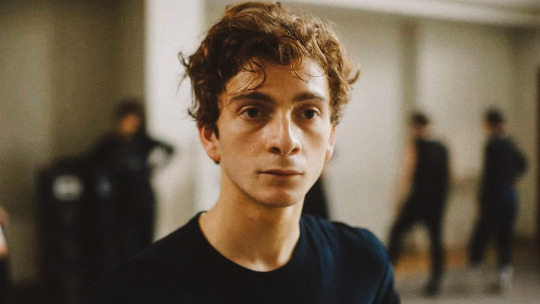
Levan Gelbakhiani in ‘And Then We Danced’.
How did that influence the message you ultimately wanted to share? The film is about finding your own place in a traditional society, and not letting anyone tell you what your traditions ought to be, or how you ought to define yourself, to be accepted as a Georgian. That discourse is all around us now. I’m really frankly tired of people telling me that, for instance, I’m not really Swedish because my parents came from Georgia, and I have a Muslim background. Also, Georgia is 90 percent predominantly Christian Orthodox now, so a lot of Georgians think you can’t be Georgian if you’re not a Christian.
There are two major contemporary music cues in the film—ABBA’s ‘Take A Chance on Me’ and Robyn’s ‘Honey’. How did those two come to be? During the Soviet Union, there was an ABBA concert on TV and I think that was one of the only one Western pop concerts that was broadcast in Soviet. I think it had to do with Sweden being social democratic, and we had sort of a good relationship with the Soviet Union so they thought, “Ok, we can show this, at least it’s not American”. It would be on every New Year’s Eve and it would be like a tradition.
So when the Soviet Union fell, ABBA had a new market with new people who also loved ABBA. So ABBA is actually very popular in Georgia! Of course ABBA is super-expensive to [license], and we had literally no money when we made this film—it was a very hard shoot. But one of the producers of the film is the son of Benny Andersson of ABBA… I figured if he likes the film, for them it’s not a big risk. I thought, I’ll try it in the rough cut and either he’ll like it and say yes or he won’t—but he loved the movie, he was crying afterwards.
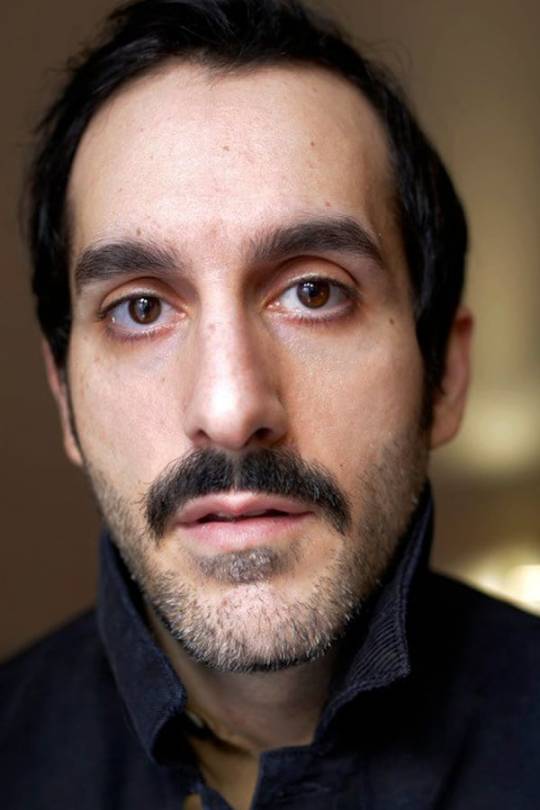
Levan Akin.
I’d also taken a risk with Robyn because that album had just come out, and we all love Robyn. We just hoped she’d like it and accept it, because we couldn’t pay her very much. Thankfully she did, and also we actually got help from Jen Malone. She’s a music supervisor and she’s so talented, and she’s the one who does the music supervision for [bands including] Euphoria, Creed and so on, so once she also got in touch she made it work for us. I’m eternally grateful to Jen.
[The following answers contain spoilers for several of the movies mentioned by Akin.]
And Then We Danced has many beautiful dance sequences. Which specific dance scenes, or dance movies broadly, inspire you? I love The Umbrellas of Cherbourg as a whole, and it has dancing in it, so that’s an easy one. In Dirty Dancing, I love the last dance, I can watch it over and over. It’s an amazing scene in every way. I also love the scene in Ex Machina where [Oscar Isaac] is dancing. It’s so nice, and so sexy.
I don’t know if there was dancing in it but I really want to mention this film—I love The Diary of A Teenage Girl. Marielle Heller is a genius. And Bel Powley and Alexander Skarsgård, they’re just so good in those parts. He was incredible! That should have won all the Oscars. In my films I never have clear antagonists, even if there are characters antagonizing the main character. I love them all, there’s no clear moral compass, everyone is just trying to do their best with the circumstances. It’s the same with this film. I love that you understand and love Alexander Skarsgård, and the guilt Minnie must have been feeling. It’s just so sensitively directed, with such a precise feeling of how to not veer in any one direction. If anyone is just shaking somewhere in that film, let’s put it in this ranking!
There’s this amazing documentary made by a Swedish documentarian, Martha & Niki. It’s about two friends who are dancers, two black girls from Sweden. Their friendship is really complicated, and they’re competing in a special dance, and you just follow them as they’re touring and competing. One of the girls is from Uganda, if I remember correctly, and another one is adopted, so they also have very different social backgrounds. I saw it in cinemas and I was just sitting and crying.
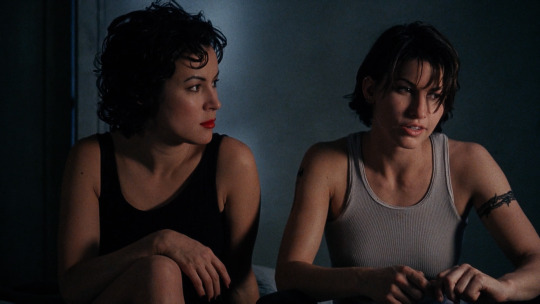
Jennifer Tilly and Gina Gershon in Bound (1996).
What are your favorite on-screen gay love stories? Brokeback Mountain. I saw that movie in New York in 2005 and I was so shocked. I just thought, “What the fuck have I just been through”? The ending… Nowadays, I would never want to kill off a character in a gay movie, but then, it’s so vague that you don’t even know what happens to them. It breaks my heart, it still does.
I really enjoyed God’s Own Country. I thought it was really moving and touching. Josh O’Connor is a revelation, and the other guy [Alec Secareanu] is amazing too. They have great chemistry. It’s just so delicately made.
I also love the Wachowski sisters’ Bound. I remember when I saw it, oh my god. Back then, seeing that was really something. I love Jennifer Tilly, what a star!
In terms of a movie that gay communities really love: Romy and Michelle’s High School Reunion. I’ve seen it literally a thousand times, I just rewind it and watch it again. It’s so amazing. When we were younger, 50 percent of the lines we would say would be lines from that film. It’s hilarious. It’s such a great story about friendship. If you haven’t seen it, congratulations, you have so much to look forward to!
And how did I almost forget My Own Private Idaho?! I saw that as a kid in the 90s, and it’s just so amazing. River Phoenix. What a movie.
Could you give the Letterboxd community a primer to some great Georgian films? I love My Happy Family, a film by Simon Groß and Nana Ekvtimishvili. They’re a directing couple. They did another film called In Bloom; about a teenage girl, it’s sort of autobiographical I can imagine, as it feels very lived. It’s about a Georgian girl in the 90s. Both films were at Sundance—My Happy Family was there three years ago and I think it won an award. [It was nominated for the Grand Jury Prize, and was Georgia’s entry for the 2013 best foreign language Academy Award]. Netflix bought it, so it’s on there now.

My Happy Family (2017).
It really shows this thing in Georgia where there is no private sphere. Families live together inter-generationally for life for many reasons—financial ones for sure. It’s the story of this woman who lives with her mother, her father, her children, everybody is in that house. She decides that one day she wants to move into her own apartment, and it’s the most shocking thing anyone has ever heard of. She says she just wants to sit alone and read books and have her own space, and everyone is so provoked by that because that can’t happen in Georgia.
There’s another Georgian film I love called Street Days, by Levan Koguashvili, which came out in 2010. It was one of the first new-generation movies in Georgia showing the reality of Georgia the way it was then. It’s the story of a man who is struggling to support his family, but he’s also a drug addict. It sounds really bleak but it’s made with such dark humor.
To go really far back to the directors working through the Soviet time, there’s The Wishing Tree by Tengiz Abuladze. So many shots from that film are so, so beautiful. It’s set in the rural parts of Georgia, and it’s about a young girl who falls in love with a boy, but they can’t be married because she has to marry an older person because it’s better for the family. And the boy she was in love with was killed by the husband. She goes insane, because she keeps thinking about it all the time; she’s talking to his ghost. This old woman in the village hears her and thinks she’s cheating on her husband, so they decide to do this ritual where they stone her. It’s so sad and so beautiful, and there’s a woman in the village who’s like the town fool but she’s the only one making sense. It’s so poetic.
Sergei Parajanov is another of my all-time favorite directors—I love The Color of Pomegranates and Ashik Kerib. He’s a great surrealist director and has inspired many directors since, such as Tarsem Singh and Mark Romanek, who did a lot of music videos in the 90s. Madonna’s video for ‘Bedtime Stories’ was really inspired by Parajanov. He worked a lot with tableaux, and it’s so queer. [Parajanov] was gay and he was imprisoned for it many times. He was very close friends with [Andrei] Tarkovsky and he attributes his artistry to being inspired by him, saying that Tarkovsky released his creativity. They were close, but they’d also fight a lot. One time Parajanov told Tarkovsky, “You can never be as amazing a director as me, because you’re not a homosexual”, which is funny!
Finally, what was the film first made you want to be a filmmaker? I love that question. It feels like I’m closing a circle because I think the movie I’m thinking of has some similarities with my movie. It’s Some Kind of Wonderful, [written] by John Hughes and directed by Howard Deutch. It’s not one of the most famous John Hughes movies but it’s one of the first ones I saw in the cinema. I think I was seven years old, I went with my older sister who was eleven at the time.
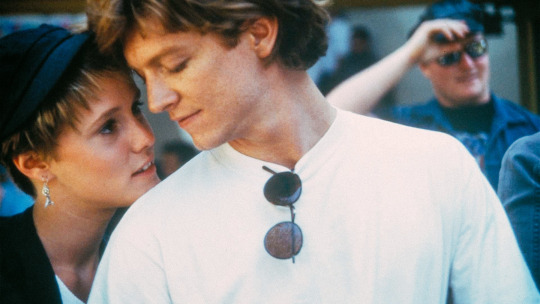
Mary Stuart Masterson and Eric Stoltz in ‘Some Kind of Wonderful’ (1987).
It’s a love triangle between Eric Stoltz, Mary Stuart Masterson and Lea Thompson. Stoltz plays this working-class kid, he lives on the wrong side of the tracks, the classic perspective that’s always in John Hughes movies. He’s in love with the popular girl in school, Amanda Jones. She is also from his part of the town but is dating the rich guys. He’s really in love with her, and his best friend is played by Masterson, she’s called Watts but her nickname is Drummer Girl, and she’s a tomboy. When I was little I thought she was a boy who was a gay character. I didn’t understand that she was a girl because I’d never seen a girl like that as a kid. It’s just a great movie, it was a love triangle before love triangles were boring. I don’t know if it consciously made me want to direct films, but it was the first film that I saw that that stuck with me.
We didn’t have a lot of movie culture in my house, my parents emigrated to Sweden in the late 60s. My father read a lot, but we didn’t come from any culture. The films I’d find were the ones you could rent in the local store. Mostly American movies. The more highbrow stuff came later when I was older and could search them out myself.
‘And Then We Danced’ premiered in Director’s Fortnight in Cannes last May, and has won several prizes at other prestigious festivals since. The film is currently showing in select cinemas on the east and west coasts of America, and opens in UK cinemas on March 13.
#levan akin#and then we danced#dance films#dance movies#georgia#georgian cinema#tibilisi#lgbt#queer cinema#gay cinema#gay filmmaker#swedish film#swedish cinema#ella kemp#dirty dancing#letterboxd
16 notes
·
View notes
Text
I found more* of Bachi and Levan giving dance lessons!!!😍❤️❤️
Source: andthenwedanced on Instagram
* till now I thought there was only this YouTube video below:
youtube
Bachi Valishvili and Levan Gelbakhiani - actors starring in swedish-georgian movie And Then We Danced / და ჩვენ ვიცეკვეთ (2019) dir. Levan Akin
#and then we danced#atwd#და ჩვენ ვიცეკვეთ#levan gelbakhiani#bachi valishvili#georgian dance#georgian culture#georgian movie#ATWD kintouri trail#kintouri#kintauri#I can't get enough of these guys!🫠#(I tried for 2 days to reblog already existing post from @cinnamoncountess with this YT video and add a Instagram video there#but the vid was always broken until I just made a new post with it🙄 I don't know how tumblr is working...)#making of atwd
5 notes
·
View notes
Text
And now my statement is:
Merab and Irakli dancing kintouri for the first time together was the closest thing to marriage there could have been!
They are now officially told: from now on you will not be one against the other but mutuals.

A ritual of same gestures made simultaneusly


Every move mirrored like repeating a marriage vow


Not to mention so many moves resemble a Ritual Marriage Dance of Cranes! (check it out if you don't believe me! And yeah, I know it's kintouri - but I've seen what I've seen)


And how they do it:
Look how Merab is trying to take it seriously - more seriously than anything before - yet he's overtaken by the joy that he neither can nor wants to supress. I don't think he would look any different getting married with his beloved.

It's that one time Aleko doesn't interrupt the dance, even seeing the imprerfections - probably studying their interactions and maybe even ready to allow some deviations for sake of the "light natured" dance?
All in all it's a profound moment - not even by a dance itself - but by the fact it's an act of confirmation that they are partners. Dance partners officially.
And from now on in their conservative society thay can actually spend time together: That's alright, you know, we're dance partners! Oh, don't you bother how close we are - that's just natural because we dance together!
And so they keep on dancing whenever they could: dancing their dance, the kintouri dance no matter if it's on the streets or on the birthday party, no matter if it's to traditional doli drums or to ABBA song...
And Then We Danced
That was another part of my #ATWD kintouri trail (and #my ATWD issues BTW). I already analysed HERE why is kintouri so important in the movie, then HERE how it may put a little different light on Luka and Davit relationship and also HERE how it gives more depth to characters' nonverbal dialog. And HERE what might Aleko's thinking process be to join our boys)
#atwd kintouri trail#and then we danced#atwd#და ჩვენ ვიცეკვეთ#merab x irakli#merab/irakli#levan akin#kintouri#traditional georgian dance#georgian culture#lgbt movie#gay movie#gays#a potem tańczyliśmy#my atwd issues
4 notes
·
View notes
Text
Now finally: Merab and Irakli are going to dance kintouri!
So it all begun with Aleko so I'm actually wondering about his thinking process:
First he decided to replace one boy with another in adjaruli dance duo. Nothing uncommon, nothing personal and definitely his goal was not to humiliate anyone - that literally what his job as a choreographer was. Yet of course he was aware how it still usually causes frustration in the boy who's been replaced and makes him jealous and angry at his "rival".

And then the very next day Aleko gets to know that the two said rivals were... practicing together this morning.
Now that was unusual.
Aleko did not know the new boy too well but he certainly knew Merab long enough to be surprised. Obviously the silent and ambitious boy is never good at making many friends, especially in the ruthless group of young male dancers. He was most probably on the sidelines, yet always ready to compete. Both too soft to win and too proud and stubborn to give up.
So what could there be in that boy from Batumi to make Merabi ever change his attitude?
Looking at the adjarian boy the man could only come up with one possible explanation for his ambitious young dancer to practice with him: he was very skilled. But also carefree at the same time (Aleko was still bitter remembering about the earring) and probably making friends a lot easier.
Anyway Aleko, being serious working man, could not make any decision based on unverified informations. Confirming what he had heard was the first thing he needed so he simply asked the boy straight about it before the classes begun. His tone was confidential yet suspicious (to Merab it sounded like a teasing but Irakli, who didn't knew Aleko well, wondered if they were accused of doing anything wrong).

Merabi, given that one most simple and socially accepted reason thar practicing with another talented boy is to improve his own dancing skills - could only approve it without a second thought.
The decision has been made. If they managed to get over the potential rivarly and enough to even practice together - it all probably brought Aleko into conclusion that they would make great partners...
In dance that is.
(Ps. Aleko actually likes Merab)
[To be continued]
That was another part of my #ATWD kintouri trail (and #my ATWD issues BTW). I already analysed HERE why is kintouri so important in the movie, then HERE how it may put a little different light on Luka and Davit relationship and also HERE how it gives more depth to characters' nonverbal dialog.
#atwd kintouri trail#and then we danced#atwd#და ჩვენ ვიცეკვეთ#levan akin#kintouri#a potem tańczyliśmy#georgian movie#my atwd issues
0 notes
Text
And Then We Danced / და ჩვენ ვიცეკვეთ (2019), dir. Levan Akin
#ATWD amateur guidebook
Soundtrack & Lyrics - Part 5 [go to: Prologue, Part 1, Part 2, Part 3, Part 4]
[Note: Most of this film music corresponds with what's happening on the screen. The less characters are speaking - the more traditional folk tunes take their turn in commenting the events. Old songs are fitting so good that the story becomes universal "tale as old as time". Lyrics translation usually comes from Google Translator and is absolutely awful but I don't speak Georgian so what else could I do]
21. ბინდისფერია სოფელი (Bindis Feria Sofeli)
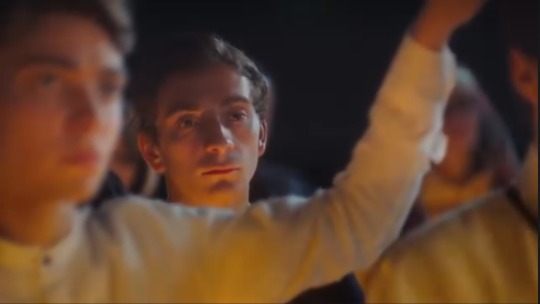
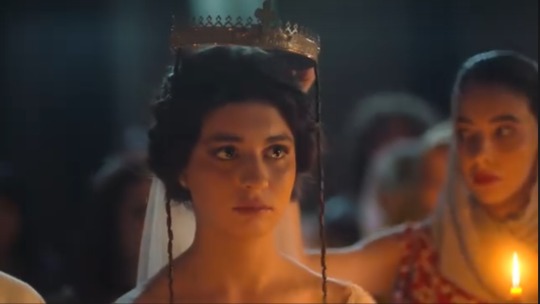
The village is gradually getting darker What is our life will fly away like a bird Someday the grass will grow on our village
Even those who thought it was hard to walk were briefly looked after. The rust of the gun will eat the rust of the earth, the heart of the man will be sad. Death will come invisible, he will throw away his weapon in a second. What we will take to the world, no one else has taken what.
[The part above is what you can hear in the movie. Below is the part that is not in the movie but I suppose is well known to Georgian audience]
I will recite the poem to you and it will be good for me to die And you will remain here as a memory of me They used to tell me that they were just like me Let the country rejoice and I die in the grave Those who are right like me will listen to the voice of panduri Don't fall apart, don't get married
[Note: 1. Lyrics I found at genius.com 2. It's worth to realize that this is one of the moments in the movie with very distinctive contrast of mood between music and the movie scene: we can see a theoretically joyfull wedding scene and Merabi's face changing from numb to overhelmed with joy - yet the song in the background speaks about death and its inevitability. Is this contrast meant to only emphasize that the wedding is actually not so joyful since it's for "saving girl's honour"? Or that Merabi's feelings are closer to grief than joy? But even when his face changes, the song keeps on going - is that to suggest that love and hope is stronger than the vision of death? or rather that this love is hopeless? You decide (Anyway - Sunrise Sunset this ain't...)]
ბინდისფერია სოფელი თანდათან უფრო ბინდდება რა არის ჩვენი სიცოცხლე ჩიტივით გაგვიფრინდება ჩვენს ნასახლარზე ოდესღაც ბალახი აბიბინდება
იმასაც მოკლედ უვლია ვინც გძლად ეგონა იარა თოფს ჟანგი შესჭამს ჟანგს მიწა, კაცის გულს დარდი იარა, მოვა სიკვდილი უჩინო, ერთ წამში აგვყრის იარაღას ჩვენ რას წავიღებთ იმქვეყნად, სხვას არა წაუღია რა.
ლექსო ამოგთქომ ოხერო თორო იქნება ვკვდებოდე, და შენ კი ჩემად სახსოვრად სააქაოსა რჩებოდე, მოსთქომდნენ ჩემებ სწორები ფანდურის ხმაზედ ჰყვებოდნენ, ქვეყანა მხიარულობდეს და მე საფლავში ვკვდებოდე, მოსთქომენ ჩემებ სწორები, ფანდურის ხმასა ჰყვებოდნენ, სახლო არ დაინგრეოდე, ცოლო არ გასთხოვდებოდე.
youtube
22. Qalaquri 1 & 2
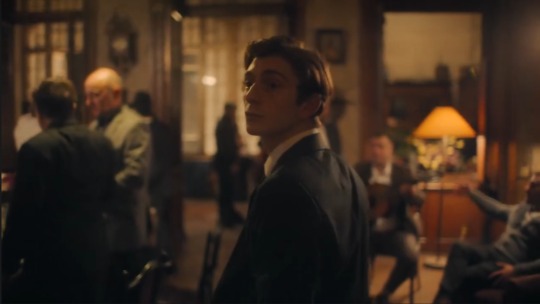
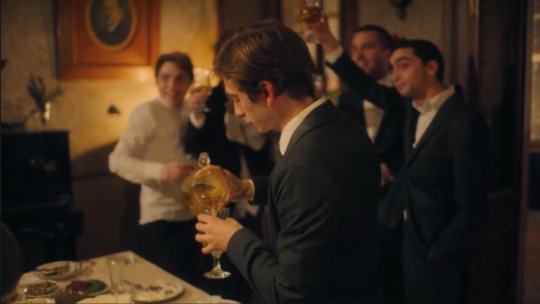
[Note: the title means "urban" but I have no idea what exact song (songs) were used in a movie. I can hear them but I can't understand a thing so I can't tell how much important this might be. IF YOU'RE GEORGIAN AND YOU KNOW WHAT THE SONG IS ABOUT - I WOULD LOVE YOU TO TELL ME!❤️ - The song is at 1h 28min of this Facebook reel)
23. განდაგანა (Gandagana)
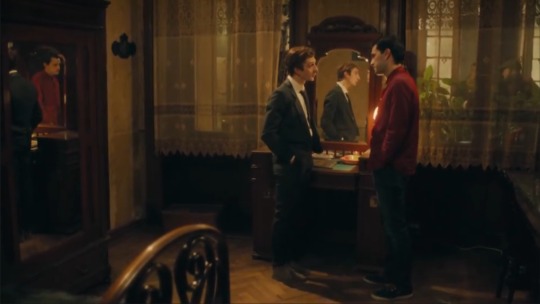
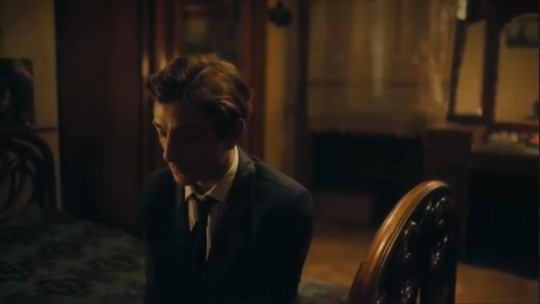
(for the meaning - read Note below)
[Note: this time I don't think it's wise to pay attention to literal translation of Gandagana because this song seems to have much more metaphorical meaning in this particular movie scene than in any other before. That kind of direct "translation" you can find at lyricstranslate.com but these sentences doesn't seem to make much deeper sense for the average outside-Georgia viewer. Better check out these interpretations below (and note that the exact moment the "Tarnanani ninano" can be heard in the movie is right before Merab's "Congratulations"):
1. according to this page: "Gandagana" is a traditional Georgian folk song about love and longing. The lyrics tell the story of two lovers who can't be together due to their families, so they express their emotions through longing and sadness. The chorus repeats the words "Tarnanani ninano" which can be roughly translated to mean "Forever we will be apart." The song reflects the difficulty of love in a time where young lovers were not always able to choose their partners, and the pain and sorrow of having to separate.
2. Overall Meaning - according to this source: The song seems to explore themes of love, longing, and the complexities of relationships. The opening lines, "Gogov gogov kiskisa, Ak chamodi tsklis pirsa, Tskali masvi kokita, Gamadzgeni kocnita," can be loosely translated as "Go, go, dear little one, Like a flame, you ignite my soul, Like a thunderstorm, you strike me." These lines express the intense and passionate nature of the relationship being described. It suggests that the presence of the beloved person has a powerful impact on the singer, evoking feelings of excitement and desire. The following lines, "Tarnanani ninano, Tskals napoti Cmaohkonda," continue the exploration of love and longing. "Tarnanani" is a word that can be interpreted as a yearning or longing, while "napoti" means a missing or longing. So, the phrase could convey a sense of the singer's deep yearning for their loved one. "Cmaohkonda" might refer to a specific place or a metaphorical state representing the separation or distance between the two individuals. The later verses delve into the complexities of the relationship, describing emotional challenges and the struggle to find balance. Lines like "Kibis uku debelio, Me ikedan verçamoval" suggest that there might be a conflict or imbalance in the love affair. The lyrics also touch upon the physical and intimate aspects of the relationship, with phrases like "Baxçaşi rom pipinebdi, Pancridan diginaxeo" depicting a sense of affection and desire. Overall, "Gandagana" captures the intense emotions and complexities that can be experienced in a passionate relationship, expressing longing, desire, and the challenges that come with it.
The lyrics comes from lyricstranslate.com
გოგოვ გოგოვ ქისქისა აქ ჭამოდი წქლის ფირსა წქალი მასვი ქოქითა გამაძგენი ქოცნითა
თარნანანი ნინანო
წქალს ნაფოთი ცმაოჰქონდა ალვისი ხის ცამონა თვალი დადექ ნაფოთომიამბე საჲვარლის სემონათვალი
ნალიაზე მე ვერ ევალ ქიბის უქუ დებელიო მე იქედან ვერჭამოვალ შენზე ჩუუხუთებელიო
თაროზე მაქვს ხუთი ვაშლი სამი შენ შიგინახეო ბახჭაში რომ ფიფინებდი ფანცრიდან დიგინახეო
youtube
24. ცანგალა და გოგონა (Tsangala Da Gogona)
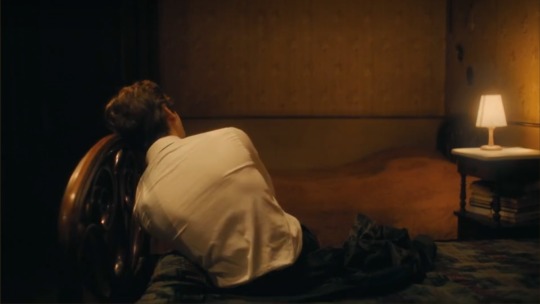
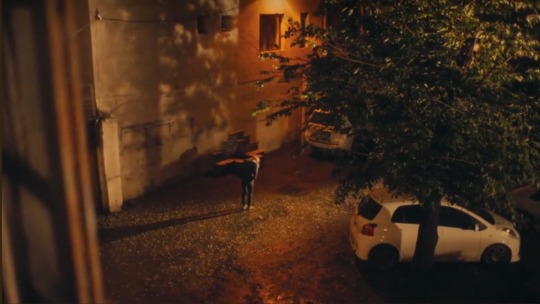
Tsangala and girl Tsangala.. girl (2)
Tsangala went to the city, And stole grape from there, He didn't share grape with anybody, And digged grave for himself (ashamed himself)
Tsangala and girl Tsangala.. girl (2)
This guy dances well, He stands on halluces, If he hurts his legs, whose fault will it be?
Tsangala and girl Tsangala.. girl (2)
[Note: 1. This song is even more contrasting to the movie scene than the song during wedding scene - Tsangala song is considered really joyfull and most people are dancing and having fun while our character falls into pieces. Could there be any better way to emphasize how lonely and separated Merab feels in his grief? 2. Lyrics was found at lyricstranslate.com ]
..ცანგალა და გოგონა-ა ცანგალა გოგონა-ა (2)
გოგნი გოგნი გოგნი გოგნი გოგნი გოგნი გოგონაა გოგნი გოგნი გოგნი გოგო გოგნი გოგნი გოგონა
ცანგალა ქალაქს წავიდა ყურძენი მოიპარა ყურძენი თვითონ შეჭამა საფლავი გაითხარა
..ცანგალა და გოგონა-ა ცანგალა გოგონა-ა (2)
გოგნი გოგნი გოგნი გოგნი გოგნი გოგონაა გოგნი გოგნი გოგნი გოგო გოგნი გოგნი გოგონა
ეს ბიჭი კარგად თამაშობს ფეხის წვერებზე დგებაა ამან რომ რამე იტკინოს გოგონას დაბრალდება
..ცანგალა და გოგონა-ა ცანგალა გოგონა-ა (2)
გოგნი გოგნი გოგნი გოგნი გოგნი გოგონაა გოგნი გოგნი გოგნი გოგო გოგნი გოგნი გოგონა
youtube
25. წინწყარო (Tsintskaro)
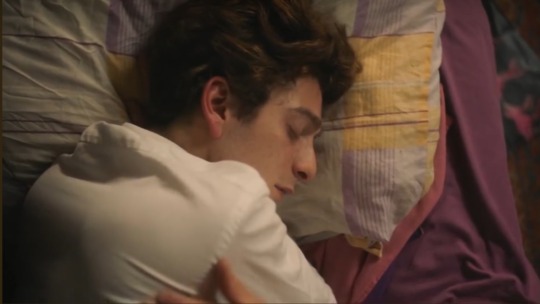
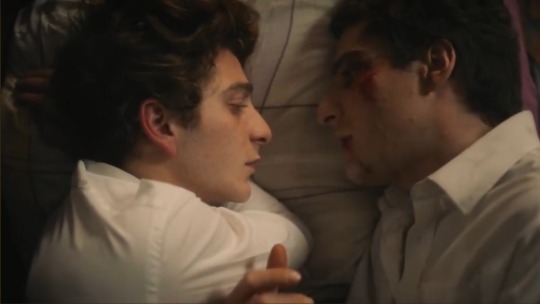
I walked by Tsintskaro, Tsintskaro... I met a beautiful woman there, with koka (a jug / picher) on her shoulder. I spoke a word to her and she got offended, got enraged, stepped aside / ran away! (By other translation: kept standing aloof )
[Note: this song was already heard sooner in the movie (morning after Merab's and Irakli's first night) and described in the Part 2. (Special thanks to @notasapleasure for helping me identify that it's the same song)
This time Davit initiates the song right after returing home from his wedding and Merab quietly starts to sing along. It seems to comfort him somehow. Is only the beloved traditional polyphonic song that is comforting or the memory it brings?
I think that, together with the fact that Merab decided not to throw down the Spirited Away poster (the one that got commented by Irakli) as he did with the rest of the posters on his wall - indicates that he still wants to think about Irakli. I think it might suggest that he wants to keep warm memory about him even after giving back the ear-ring (and I'm mentioning it because I've seen some reviews interpreting the ear-ring scene as "it's over", letting go, Merab deciding that he discovered and accepted his own self and doesn't need Irakli anymore. I think that yes, maybe his approach was to be seen as taugh and proud in the eyes of his leaving lover, but it does not necessarily reflect what he really felt nor how hard giving that ring back was for him). Now all that is left is Spirited Away poster. And Tsintskaro.]
youtube
X. Final dance

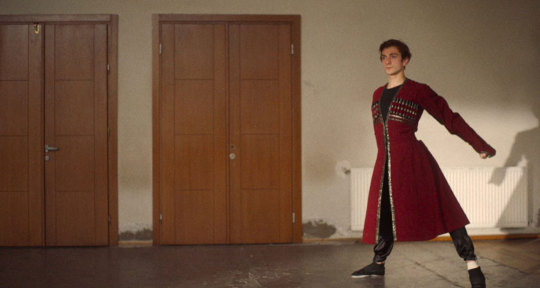
[No words, only mood]
youtube
26. რა ლამაზია თუშეთი (Ra Lamazia Tusheti)
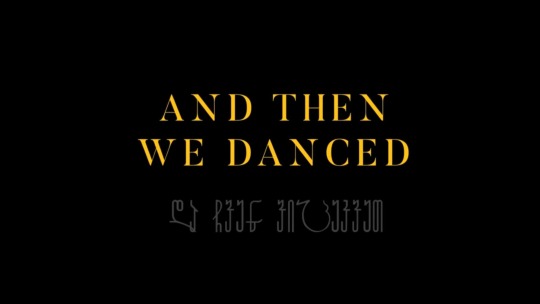
"How beautiful is Tusheti/Georgia"
How beautiful Tusheti and Lasharoba Tushur are, with twisted horns and a forehead with a candle.
There is a curvy son and a woman crouching on the slope, the water of the wild Alazni singing in the Ewes.
Drinking cold beer with the horn of a stall, barbecuing naked on the fire, fingers dancing on the harmonica of a Tush woman.
I close my eyes, I can still see the necks of the horses and the wolf-clad shepherd boys in the horse's harness.
The blue-dressed pines stand like a bride, I love Dartlo and Chigo mountain, I burn them with love.
How good was Tusheti and Lasharoba Tushur, Chedila with twisted horns, forehead with a candle.
Grilled barbecues cooked on ghadar
[Note: 1. The translation is awful because I could only use google-translator. But the general meaning undoubtly is "How beautiful is Georgia". And I think that's another of the series of music contrasting the movie action. The end of the movie rather leaves us with a feeling of "how untollerant" Georgia is, so the song seems a bit ironical. But let's not forget that Merab actually loves his country and its culture, dances and food... so maybe it's not ironical at all? Georgia is beautiful and young people wish they could love their country freely and not have to plan leaving it for their safety 2. Lyrics source is lyricstranlate.com ]
"რა ლამაზია თუშეთი"
რა ლამაზია თუშეთი და ლაშარო��ა თუშური, რქებჩაგრეხილი ჭედილა სანთლით შუბლგადატრუსული. ფერდობზე ჩამწკრივებული კოხტა ვაჟი და ქალია, ევებში ამღერებული შმაგი ალაზნის წყალია. ჯიხვის რქით ცივი ლუდის სმა, ცეცხლზე შიშხინი მწვადისა, გარმონზე აცეკვებული თითები თუშის ქალისა.
თვალებს დავხუჭავ, კვლავ მოსჩანს სადოღე ცხენთა კისრები და ქორბეღელას ფერხულში მგლისმუხლა მწყემსი ბიჭები. პატარძალივით დამდგარან ლურჯკაბიანი ფიჭვები, მიყვარს დართლო და ჩიღოს მთა, მათ სიყვარულით ვიწვები. რა კარგი იყო თუშეთი და ლაშარობა თუშური, რქებჩაგრეხილი ჭედილა, სანთლით შუბლგადატუსული. ცვარმოდებული მწვადები ღადარზე გამოშუშული
youtube
27. Kinto's Song
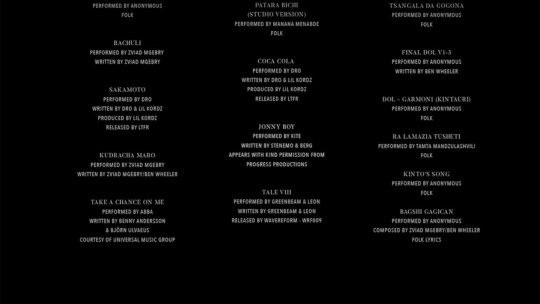
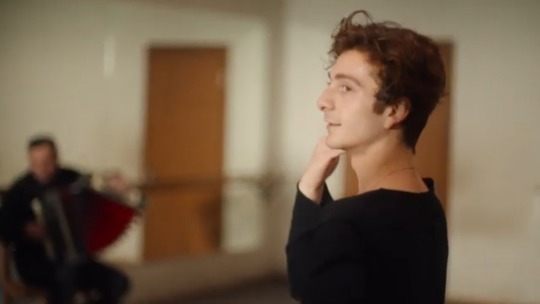
I don't know what to do anymore I don't know what to do anymore I have only one heart How can I divide the two? Muhammad and Abdul too I swear to love Both of them fall in love How will it be? One promised me a scarf for love The other one kills himself for my sake I like you both What can I do, what do you want? Love to both Tell me how to separate you Muhammad and Abdul Don't bother me like that my heart and love I am only changing one One promised me a scarf for love The other one kills himself for my sake
[Note: 1. Kintauri and Kinto's culture is so important in the movie I already made SEPARATE POST ABOUT IT and the whole separate tag: #ATWD kintouri trail . To summarise it: kinto were street fruit sellers in Tbilisi in early 20th century, with characteristic clothes and dance (kintouri) and many of them were gay men (though this fact is many times ommited in georgian sources). The "Kinto's song" was found on old x-ray record and it also tells about gay love. This all brings important context to the fact that Merab and Irakli became dance partners of kintouri duo and were dancing parts of this particular dance throughout the whole movie. 2. Once again the translation comes from google-translator and the lyrics from marketer.ge )
აღარ ვიცი რა ვქნა მე აღარ ვიცი რა ვუყო გული მხოლოდ ერთი მაქვს ორს კი როგორ გავუყო მუჰამედ და აბდულიც სიყვარულს მეფიცება ორივეს შეყვარება აბა როგორ იქნება ერთმა შარფი დამპირდა სიყვარულისთვის მეორე კი თავს იკლავს
ჩემი გულისთვის მე ორივე მომწონხართ აბა რა ვქნა, რა გიყოთ სიყვარული ორივეს მითხარ, როგორ გაგიყოთ მუჰამედ და აბდული ასე ნუღა მაწვალებთ ჩემს გულს და სიყვარულს მხოლოდ ერთს ვანაცვალებ ერთმა შარფი დამპირდა სიყვარულისთვის მეორე კი თავს იკლავს ჩემი გულისთვის
youtube
28. ბაღში გაგიცან (Baghshi Gagitsan)

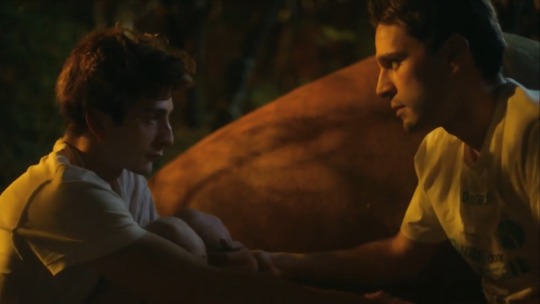
I met you in the garden for the first time, I looked at the moon Your throat was like white wine in a glass I looked at it and couldn't stand those twinkling eyes The twinkling light of your eyes turned into a light
Are you born of your mother or are you a fairy flying from the sky? What pen wrote the eyebrows of your eyes If you ordered me, you know what I would do for you I would move the place where you were born to my house
I would like to know, beautiful, where you are staying In which region does such a good fruit grow? If you ordered me, you know what I would do for you I would move the place where you were born to my house
[Note: 1. As crucial as this song is for the whole And Then We Danced movie I was able not find any good translation of this lyrics that would sound satisfying enough. But I have no doubts that the first verse of this song is directly reffering to Merab and Irakli meeting behind the kvevri in the vineyard!❤️ If not for the fact that the crucial scene is left without music - one might imagine this song to be a perfect background music. Could it be another example of following contrasts in the movie? Love scene between boy and girl might openly refer to a traditional song - but for our boys the song is only secretly suggested in end credits... 2. Source of the lyrics was tsutisopeli.com and archives from alazani.ge ]
ბაღში გაგიცან პირველად
ბაღში გაგიცან პირველად თვალი შეგავლე მთვარესა ყელი გიგავდა ალალ ღვინოს ჭიქაში მდგომიარესა ვერ მოვითმინე, ვერ შევხედე მაგ მოციმციმე თვალებსა შენი თვალების ციმციმი შუქად ეფინა არესა
დედაის ნაშობი ხარ თუ ცით მოფრენილი ფერია შენი თვალების წარბები რა კალამს დაუწერია რომ მიბრძანებდე მე შენთვის იცი რას გადავიტანდი იმ ადგილს რამანც შენ გშობა ჩემს სახლში გადავიტანდი
ნეტავ ვიცოდე ლამაზო სად არის შენი სამყოფი რომელ მხარეში იზრდება ასეთი კარგი ნაყოფი რომ მიბრძანებდე მე შენთვის იცი რას გადავიტანდი იმ ადგილს რამანც შენ გშობა ჩემს შახლში გადავიტანდი
youtube
-------------- go to Prologue ---------------
--------------- go to Part 1 ------------------
--------------- go to Part 2 ------------------
--------------- go to Part 3 ------------------
--------------- go to Part 4 ------------------
#ATWD amateur guidebook#and then we danced#atwd#და ჩვენ ვიცეკვეთ#ATWD kintouri trail#and then we danced soundtrack#levan akin#georgian culture#georgian music#georgian movie#ქართული#I MADE IT! OMG I FINALLY MADE IT!!!🥳 the first part came out in 20th july so I managed to finish the series within a year!💪#the draft was there since november. you can only guess how long it was taking me to scroll through all the drafts to come back to it😂#oh my imagine translating over 20 songs in the language you don't speak with lyrics written with very different letters...#...only to find out these songs' meaning in your favorite movie!❤️❤️❤️#This wasn't easy this wasn't clever and I'm definitely not normal person - but I am so proud of myself!👏👏👏😁#(now expect me reblogging the whole series - sorry not sorry - I deserve the satisfaction)#(I also would love to make another blog filled with cultural knowledge of ATWD. do you know some ppl watched it few times#NOT knowing what things like tamada supra or kvevri are?! so much knowledge still to share!)
3 notes
·
View notes
Text
And Then We Danced / და ჩვენ ვიცეკვეთ (2019), dir. Levan Akin
#ATWD amateur guidebook
Soundtrack & Lyrics - Prologue [go to: Part 1, Part 2, Part 3, Part 4, Part 5]


Note:
Here's the old man's speech. There's no music in the background right now (kind of distinctive that it's been roughly interrupted?) but I still think it's a key moment to understand how important the music is in this movie:
The old man is so sure of himself when lecturing the boy of what ქართული ცეკვა (georgian dance) really means.
What he doesn't know though is that this young dancer before his eyes already is someone who impersonates "the spirit of our nation" the best.
We can be sure that Merab truly loves traditional dance of his nation, as well as the rest of the georgian culture he grown up with. Whenever he dances he can't hide how much he enjoys it. Every free hour he spends watching old historical films with traditional georgian dance.


While other guys spend the night in town, he'd rather be practicing in his room in the middle of the night or in the studio early in the morning. Even above his own bed - there are no posters with football-players you might expect of a boy at his age - but only dancers of traditional georgian dance. Merab is simply a young passionate guy totally devoted to the culture and tradition of his ancesors. Just look how his eyes glow when he can try on this festive chokha!


But all in all he is just a quiet, sensible boy. And so whenever his emotions rise that he can't otherwise express - we can hear the music, as if it was his heart singing! Sometimes it sings with old folk tunes, sometimes with modern georgian music. Sometimes with popular music which is not georgian at all... and yet Merab manages to always make it a little more georgian: either by dancing kintouri moves to ABBA or wearing papakha to Robyn's song.


That's how you continue ancient tradition with youthful vigour. A perfectly mixed up cultural cocktail with no false taste - exactly what "a spirit of our nation" should be.
And yet this potential is wasted. All the voices telling him he's not good enough (his dad) or not tough enough (his teacher) he can still endure. But only until the moment when social expectations of his beloved "traditional" culture take away his love - and break his heart...


He will not be this nation's spirit anymore


Because "there is no future" for him in Georgia
--------------- go to Part 1 ------------------
--------------- go to Part 2 ------------------
--------------- go to Part 3 ------------------
--------------- go to Part 4 ------------------
--------------- go to Part 5 ------------------
#ATWD amateur guidebook#and then we danced soundtrack#and then we danced#atwd#და ჩვენ ვიცეკვეთ#merab lominadze#georgian culture#georgian traditional dance#georgian movie#a potem tańczyliśmy#Merab jest jak gruziński Janko Muzykant#Duch narodu w tańcu kintouri
3 notes
·
View notes
Text
Compilation of #bird version ATWD :
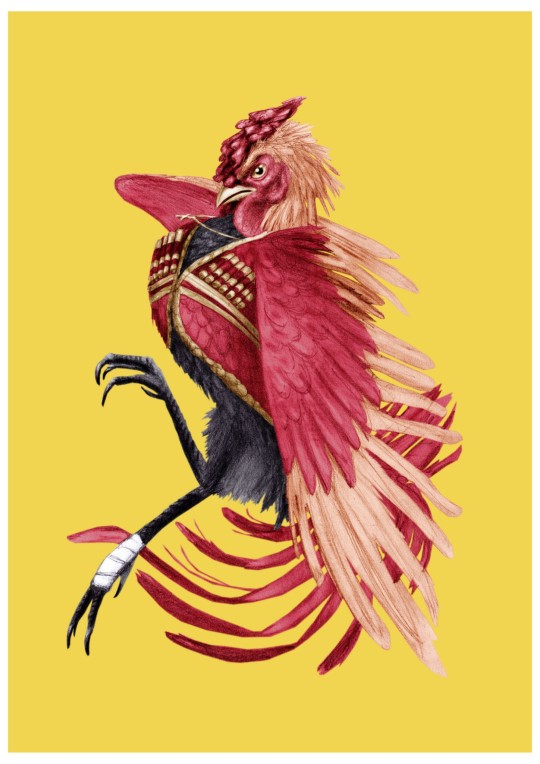
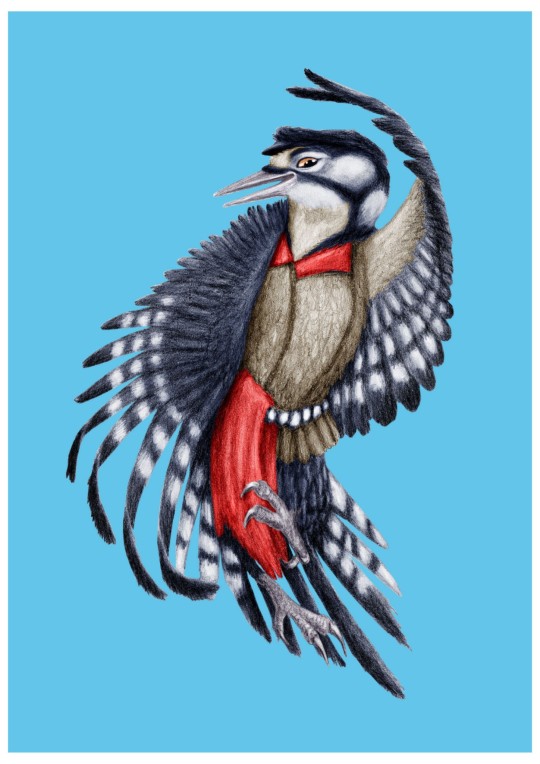
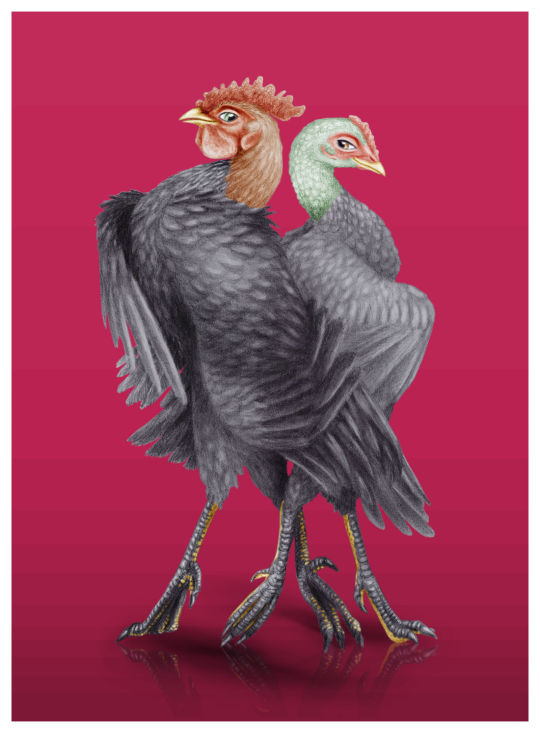
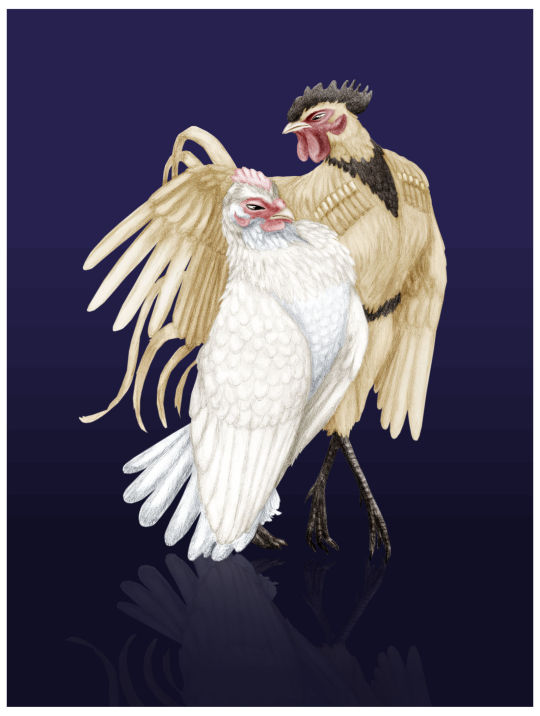
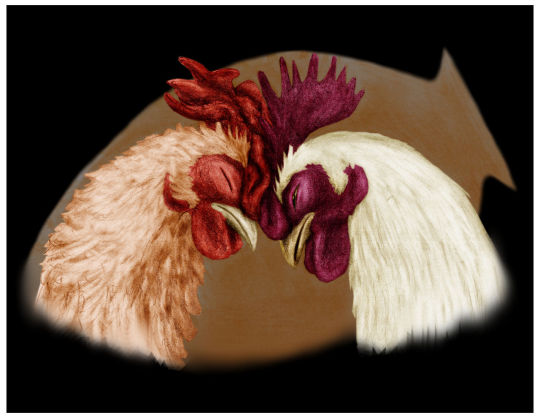

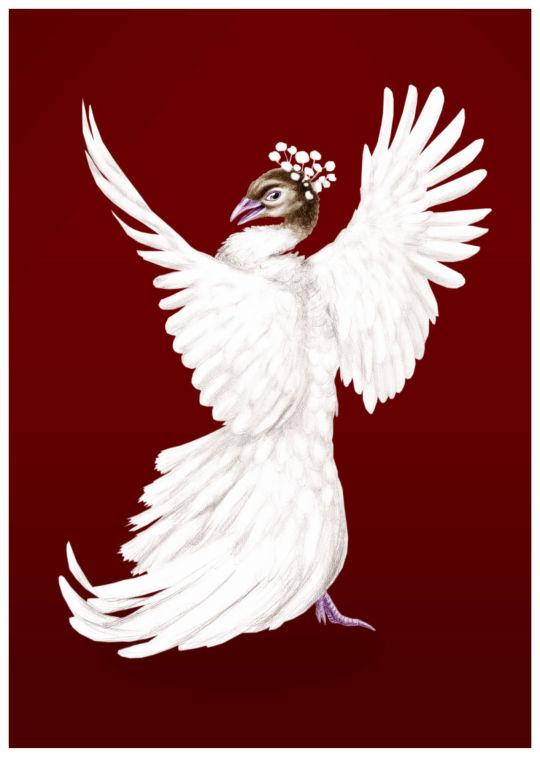
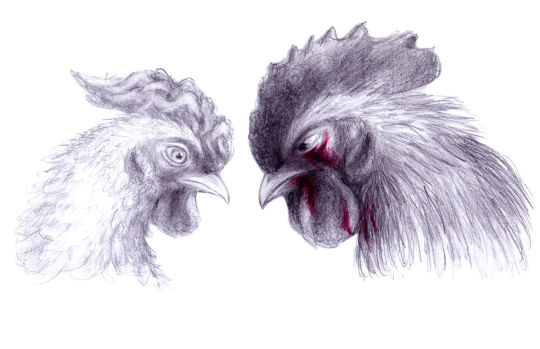
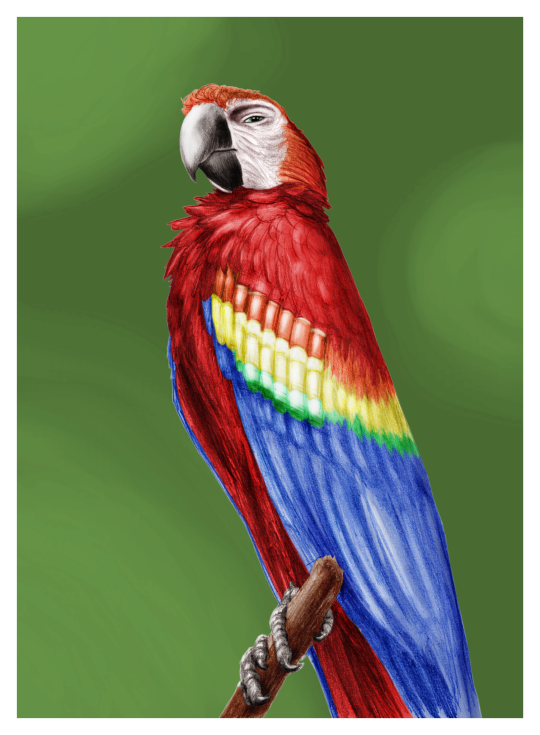
Final Dance
Kintouri / კინტოური
Adjaruli / აჯარული ცეკვა
Simd / სიმდი
Kvevri / ქვევრი
Papakha / ფაფახი
Sopo / ცანგალა და გოგონა
Brother's Talk
Bird Of Pride
My fanarts of the most beautiful movie: And Then We Danced / და ჩვენ ვიცეკვეთ (2019) dir. Levan Akin
(Blessed by the director himself!🥰)
#bird version ATWD#my art#oh dear do I dare to brag about my own art? OF COURSE I F*CKING DARE! IT'S THE BEST MOST SUCCESSFUL ART SERIES I EVER DID SO FAR!!!#I love how it turned out! Even LEVAN AKIN liked it!🥹 I'm so happy and proud it gives me wings!#and then we danced#და ჩვენ ვიცეკვეთ#atwd#levan akin#georgian movie#georgian traditional dance#gay movie#lgbt movie#rooster#chicken#hen#woodpecker#parrot#peacock#cocks rubbing#a potem tańczyliśmy
29 notes
·
View notes
Text
She already allowed me to speak about my pictures and my inspirations and I took courage to tell her a bit abt those pics inspired by my favorite movie
So maybe also I could have and should have managed to infodump her about it even more? What if I told her about that time my fanart received a like and comment from the movie director and the main actor and how someone find out a movie scene resembles a "To Mannesker" sculpture and how I was the first to notice how "Irakli's room" and "Honey" scenes are so much similar and how important is the kintouri dance in the whole movie with kinto's song in the end credits indicating a queer history in Georgia and with Irakli sending a dance-coded-message to Merab in the "pomegranate" scene and how I managed to translate all the music used in the film even the one in the car though only thanks to my friend and how every song relates so much to the scene it serves like "lion slayer" or "panduri, help me sing about the sunlight beauty" or "fly little butterfly" and how all the songs in those scenes are so sooo fitting it just breaks my heart🫠
Though why would I tell her all that if she never seen a movie and
And then I couldn't fall asleep untill 4 am
I hate my brain
#and then we danced#და ჩვენ ვიცეკვეთ#atwd#I so wish I could find someone to infodump them about everything I know about ATWD and Georgia...#I was talking with my older cousin in August and with my roommate last week... but what's the point of talking#about the movie they haven't seen? rule one: don't talk about it. rule two: if you do - don't encourage them to watch it.#even if they watch it - they won't love it. even if they like it - they're not nearly as obsessed as you#go explode your knowledge and feelings somewhere else please#hyperfixation
1 note
·
View note
Text

Khastegi (2008) dir. Bahman Motamedian [gif author: @celluloidrainbow ]

And Then We Danced / და ჩვენ ვიცეკვეთ (2019) dir. Levan Akin
Examples of hands and hips movements in persian dance in Tehran (Iran) and kintouri / კინტოური in Tbilisi (Georgia)
#ATWD kintouri trail#kintouri#persian dance#iranian#iran#georgian#Georgia#and then we danced#atwd#და ჩვენ ვიცეკვეთ#khastegi#similar#similar scenes#dance#dance moves#masculine and feminine#seek similarities brain mode#a potem tańczyliśmy
24 notes
·
View notes